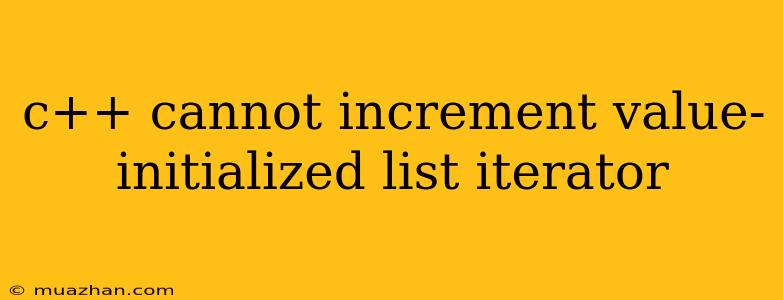C++: Cannot Increment Value-Initialized List Iterator
When you try to increment an iterator of a value-initialized std::list in C++, you might encounter the error "cannot increment value-initialized list iterator." This error arises because value-initialized lists are empty by default, and attempting to increment an iterator on an empty list is undefined behavior.
Here's a breakdown of the issue and solutions:
Understanding Value Initialization and Lists
- Value initialization in C++ means initializing a variable with its default value. For
std::list, this means it starts empty. - Iterators are used to traverse through elements within a container.
When you try to increment an iterator in an empty list, you're essentially trying to access an element that doesn't exist. This leads to the "cannot increment value-initialized list iterator" error.
Example Scenario
#include
#include
int main() {
std::list myList; // Value-initialized, empty list
std::list::iterator it = myList.begin();
// This will lead to the error:
it++;
return 0;
}
Solutions:
-
Initialize the list with elements: Ensure your
std::listhas elements before attempting to increment its iterator.std::listmyList = {1, 2, 3}; // Initialize with elements -
Check for empty list: Before incrementing, verify that the list is not empty.
if (!myList.empty()) { std::list::iterator it = myList.begin(); it++; // Safe to increment now } else { std::cout << "List is empty, cannot increment iterator." << std::endl; } -
Use
std::advance: This function safely increments an iterator by a specified number of steps, handling boundary conditions.std::list::iterator it = myList.begin(); if (!myList.empty()) { std::advance(it, 1); // Increment by one position } -
Iterate with
forloop: Use aforloop to safely iterate through the list, avoiding potential errors.for (auto it = myList.begin(); it != myList.end(); ++it) { // Process each element }
By implementing these solutions, you can ensure that your code handles list iteration correctly, avoiding the "cannot increment value-initialized list iterator" error.
